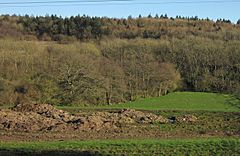Cogley Wood facts for kids
| Site of Special Scientific Interest | |
 |
|
| Area of Search | Somerset |
|---|---|
| Coordinates | 51°06′32″N 2°25′32″W / 51.10902°N 2.42562°W |
| Interest | Biological |
| Area | 60.7 hectares (0.607 km2; 0.234 sq mi) |
| Notification | 1987 |
Cogley Wood is a very special place for nature in Somerset, England. It's a large forest area, about 60.7 hectares big. That's like 150 football fields! It was officially recognized as a Site of Special Scientific Interest (SSSI) in 1987. This means it's protected because of its important plants and animals.
Contents
Discover Cogley Wood
Cogley Wood gets its name from old words meaning "a clearing with birds." It's located on the eastern side of the River Brue valley, near the town of Bruton. Many small streams that feed into the River Brue start right here in the wood.
This area is made up of two big parts of very old, natural woodland. It's a fantastic place for many different kinds of butterflies.
A Special Place for Nature
Being a Site of Special Scientific Interest (SSSI) means Cogley Wood is one of the best places in the country for wildlife. It's protected by law to make sure its unique natural features are kept safe. This helps rare plants and animals continue to live and thrive here.
Amazing Plants and Trees
The wood is home to many types of trees. You can find tall ash trees (Fraxinus excelsior), strong oak trees (Quercus robur), and beautiful wild cherry trees (Prunus avium). There are also wych elm trees (Ulmus glabra).
On the forest floor, you'll see plants like dog's mercury (Mercurialis perennis) and the lovely common bluebell (Hyacinthoides non-scripta). Other interesting plants include the greater butterfly-orchid (Platanthera chlorantha) and meadow saffron (Colchicum autumnale).
Home to Beautiful Butterflies
Cogley Wood is famous for its amazing butterfly population. Scientists have recorded 36 different kinds of butterflies that live and breed here! This makes it a very important spot for these insects.
Some of the special butterflies you might see include:
- Marsh fritillary (Euphydryas aurinia)
- High brown fritillary (Argynnis cydippe)
- Brown hairstreak (Thecla betulae)
- Duke of Burgundy (Hamearis lucina)
- Purple emperor (Apatura iris)
These butterflies are an important part of the wood's ecosystem. They help pollinate plants and are a sign of a healthy environment.
 | Bayard Rustin |
 | Jeannette Carter |
 | Jeremiah A. Brown |

